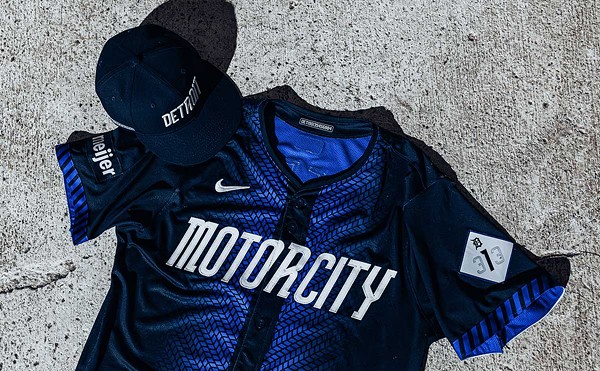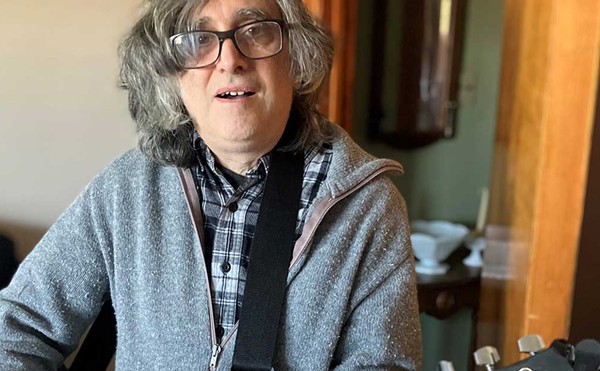Movement kicks off with the official Movement Opening Party on Friday, May 25, featuring Life and Death, Matt Tolfrey vs. Ryan Crosson, Thugfucker and others. The fest continues Saturday-Monday, May 26-28, at Hart Plaza, at the foot of Woodward Avenue in Detroit. See movement.us for further info.
Thirteen years after the festival began, dance music has never been bigger — and this year's Movement has never been more underground.
Back in 2000, when Carl Craig first dove deep into his Rolodex of friends, favors and festival experiences in Europe to pull together what would become the first Detroit Electronic Music Festival, the idea of a local event, sanctioned by the city of Detroit, dedicated to a type of music an average Detroiter was as apt to hear about in a news report about a rave getting busted up by the DPD as by their own radio memories of Electrifyin' Mojo or the Wizard, seemed more like a love letter to the city than a techno manifesto.
As Craig explained wistfully, "I always wanted to serenade the Renaissance Center." Now, 13 years later, Movement has become, like the Detroit techno sound that inspired it, the grand old man of an electronic dance music (EDM) scene and sound that's never been more popular. Who would have thought Berry Gordy's grandson and nephew would be introducing spring break audiences to the joys of acid house and TR303-blip freakouts after themselves famously embracing the party-rocking potential of underground dance music after a trip to Miami's Winter Music Conference and, specifically, the Ultra Music Festival (UMF) a few years back? LMFAO, indeed.
UMF started as a daytime beach party to showcase artists on the Ultra label in the mid-'90s, and last March it attracted 165,000 day-trippers (one who famously humped a tree and one who famously was Madonna, crashing the stage making sly cockney rhyming slang references to ecstasy). Electric Daisy Carnival, with stops in Vegas and now New York, attracts a quarter of a million fans, while DJ residencies at Vegas mega-clubs are making people who play other people's music their own millionaires. Skrillex, whose dubstep wobble-wobble-wonk-wonk was as much an anomaly as a highlight of last year's Movement, now commands six figures a gig — he's booked through 2013. Whaat-whaat-whaaaaaa? An article in UK's Guardian last week proclaimed, "Electronic dance music is now the biggest youth movement in America since hip-hop — and David Guetta is spearheading it."
But he's not playing Movement.
"He actually approached us about doing it, but we said no," says Paxahau's Chuck Flask, who, along with partners Jason Huvaere, Sam Fotias and Jason Clark, has booked Movement since 2006. It's not the first time Paxahau has had to turn someone down (Deadmau5, etc.) who wouldn't add to the mix so much as distract from it. Especially from a lineup that's "more curated than booked," as Fotias puts it. "Hart Plaza without anyone in it only has a capacity of 45,000. We can only put 8,000 in front of the main stage to not piss off the fire marshal," he adds diplomatically. Not that the festival shies away from names — two years ago, Moby rebooted his DJ career here; last year, it was Fatboy Slim, whose laser light show had Paxahau scrambling to get FAA clearance.
But as this weekend's lineup shows, Paxahau has perfected the ability to ride trends without getting carried away with them, like dubstep — which is about as popular and polarizing in EDM as ICP is in rap — by booking such artists as L.A.'s Dillon Francis or hip-hopper Araabmuzik. As Claude Von Stroke, a San Francisco-via-Detroit DJ-producer playing his third Movement this weekend, says, "I remember the third or fourth year of the festival seeing famous Detroit DJs going around with a hat to collect donations. In this way, I think the festival has grown up. And this is not necessarily a bad thing. Commercial doesn't always have to mean cheesy." In fact, in the case of the Martinez Brothers, those NuYorican kids with a Blackberry commercial ("We need tools not toys"), quite the opposite is true: they make house music that sounds older than they are.
If there's a theme to the festival this year, it's the sustainability of classic over commercial. Mainstage headliners Lil Louis, Public Enemy and Jeff Mills in his "the Wizard" '80s radio-mix persona, were headliners before the majority of the kids who'll see them this weekend were even born. Chicago house O.G. Lil Louis' "French Kiss" is famously Derrick May's signature track, and has even been covered by Josh Wink (also playing this year) more than a decade ago. Public Enemy is on its 25th anniversary tour, with Chuck D as militant as ever: "Urban radio is a disease for black music," he says, noting that electronic music might be the last genre where the DJ still is king. "And I like to see DJs with abilities." It was Paxahau's idea for Jeff Mills to perform as the Wizard — which is as synonymous with old-school techno's eclectic DJ style as the Electrifyin' Mojo was with its imagination. Mills says he's down with the idea. "I'll be DJing a mixture of techno, house, bass station, hip-hop — a lot things people used to call the station [WDRQ] and request," Mills says.
It's retro-techno, but like Movement itself, Mills says there is a bigger statement. "Some people forgot that Detroit was always famous for mixing styles and genres. We played what we thought was 'good quality' — music was much less segmented," he says.
So in this spirit, Guetta might not get a gig, but Gary Lewis, a UK selector in his 50s who DJs on reel-to-reel machines, does. Fotias says, "We want people to see history."
What the rest of the country sees, says Kerri Mason, a New York-based writer covering EDM for Billboard, is an outpost of integrity. "Movement's really the last festival booking credible, consistent artists who are still doing what they do in the more competitive, commercial national scene." Andre Osyka of L.A. trio Droog (playing Saturday 4:30-6 p.m. on the Underground stage) sums it up: "Anyone who has been pushing the more 'underground' sound in the U.S. has a strong philosophical connection to Detroit." Von Stroke concurs, saying, "The influx of new money into the scene has created festivals with cookie-cutter lineups put together by promoters counting Facebook likes instead of listening to mixtapes and new releases. The Detroit festival is still all about Detroit. It's like the Nuit Sonores [festival] in Lyon where the programmers obviously care a lot. But Movement also has that special feeling of being a Midwestern rave with Midwestern people — like you put a sound system at Cedar Point or something."
It's that special feeling that Dan Sicko, the late, great techno author and authority on the Detroit sound, referred to as "the stargazing, hope-filled, melodic, simultaneously eulogizing and celebrating side of techno." He wrote that shortly before his death last year, describing a track by Underground Resistance side project Galaxy 2 Galaxy that was left off an NPR Top Ten list before last year's festival, itself a sign of how popular Movement had become, but also, tellingly, why the focus this year is on the history of the genre, not its popularity. Dan would be proud.





